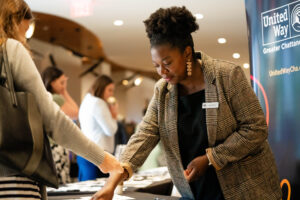Holly Bonner
With the help of Mayor Andy Berke’s office, the Chattanooga Chamber of Commerce and The Urban League of Greater Chattanooga, a group of UTC students keeps the legacies of Ed Johnson and Styles L. Hutchins alive. Known as the Styles L. Hutchins Fellows, they've crafted a plan to retain and attract diverse talent.
“Succeeding in the Fellowship and creating Chattanooga as a city where black students can live and thrive would not only mean that I could live and thrive here, but that generations of diverse students could as well,” says Fellow Ryenne McDowell.
Joining together in the Styles L. Hutchins Fellowship, four students united to create a team rich in skills and knowledge. McDowell, Inaugural Cohort President, political science major and Spanish minor, led the cause. Working alongside her were Marquise Tate, a senior mass communications major, Khadesha Gordon, a junior political science and public service double major, and Dominique Malone, now an investigator at the Southern Center for Human Rights in Atlanta.
Whether you’re a Chattanooga resident or visitor, you have likely admired our scenic skyline from the Walnut Street Bridge. Crowning the Tennessee River, the bridge offers a unique view of our neighboring mountains and downtown developments. At the heart of Chattanooga’s food, entertainment and outdoor scene, the bridge draws joggers, strollers, dog-walkers and photo seekers. But that has not always been true.
Beginning in the early 20th century, the bridge served as a barrier between the south side’s predominantly white community and the north side’s growing black community. That racial tension led to the lynching of Ed Johnson, a young African-American male wrongly convicted by an all-white Supreme Court jury. Following the case, Styles L. Hutchins, Johnson’s attorney, fled Chattanooga for fear he would receive the same treatment.
Almost 100 years later, it’s hard to imagine our beloved Walnut Street Bridge carries such a horrific piece of history. The bridge continued to stand tall through the civil rights movement and many other historical events to become a local landmark today.
“When I came here, it was a culture shock to see black people not having access to political power or influencing business,” Tate says. “After having the chance to participate in this fellowship, I got to peek behind the curtain and see (black) leaders making changes in the community. I just wasn't seeing it initially on campus. So figuring out how to increase that visibility and show students that people of color are making changes is what's important.”
Using the Brookings Institution’s Millennial Generation Report, the fellows identified much of the rising U.S. workforce to be post-millennial minorities like themselves. As emerging professionals, they wanted to boost local opportunities for those groups, as well as awareness about them.
They surveyed junior and senior UTC students, and results illustrated that black students prioritize jobs, cultural/social activities and affordable housing as top three factors of choosing a city they want to stay in.
The survey also highlighted a gap in student perceptions of University inclusion efforts.
“63% of white students agree that UTC prioritizes diversity and inclusion when making decisions for the university, while only 32% of African-American students agree with that statement,” McDowell says.
While educational attainment is important, the Fellows say we must push the boundaries even further if we want to recruit and retain young black talent. As they discovered, benchmark cities like Atlanta and Charlotte that have succeeded in attracting minority young people share five common themes including:
- Historically black colleges and universities
- A positive minority growth trend
- Professional sports teams
- A middle career, white-collar job market
- Robust black professional networks
A Politico survey of mayors cited by the fellows showed the greatest challenges for attracting and retaining millenials are a lack of affordable housing and reliable transportation.
“If you are spending half of your annual income to live and pay for a place to lay your head, how are you going to be able to afford different opportunities the city has to offer?” Tate says. “That puts people in a box. So, figuring out how to break their box open and give people access to a balanced economic background would probably be the best solution.”
Based on their primary and secondary research, the Styles L. Hutchins Fellows outlined four key components of creating a flourishing Chattanooga where black young talent feels represented:
- Reimagine East MLK as a cultural hub through establishment of a cultural overlay district
- Develop marketing strategies and centralized resources supporting career placement of diverse graduates
- Implement transit improvements as both a long- and short-term solution for mobility and access
- Strengthen and expand diversity, equity and inclusion efforts at UTC
“After having the opportunity to connect with different people and figuring out what my purpose was in the city at large, I feel as though I have the tools necessary to pour into the community and make effective change,” Tate says.
This spring, fellow Khadesha Gordon heads the implementation stage, guiding the next class of three fellows in working with regional stakeholders to execute the plan her cohort created.
Let’s follow the lead of the Styles L. Hutchins Fellows in creating a bridge guiding us to the next generation of diverse professionals.
Learn more and read the full report of the Fellows’ recommendations here.





![Brev.dev co-founders [L] Alec Fong and [R] Nader Khalil Brev.dev co-founders [L] Alec Fong and [R] Nader Khalil](https://www.chattanoogatrend.com/wp-content/uploads/2024/08/Brev.dev-co-founders-L-Alec-Fong-and-R-Nader-Khalil--226x300.jpeg)
